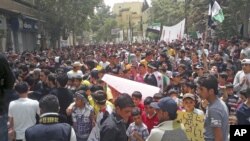As repeated bombing attacks hit Syria, concerns are rising that al-Qaida terrorists may be opening a dangerous new chapter in a conflict that has killed thousands of people.
Protesters flee gunfire in the Syrian town of Aleppo. And near Damascus, amateur video shows United Nations peace monitors edging their vans through anti-government protesters.
The protests came after massive car bombs Thursday killed more than 50 people. The bombs raise fears that the Syrian conflict could be worsening as al-Qaida terrorists step into the political chaos.
“I think this is a symptom of the fact that the conflict is attracting the influx of jihadists who are often involved in these kinds of suicide attacks. And specifically it looks like al-Qaida,” said Heritage Foundation senior Middle East analyst James Phillips.
The Syrian government is urging the U.N. Security Council to take action in the wake of the blasts.
It says they are proof that Syria is facing terrorist attacks led by groups receiving foreign support.
Until now, Syrian groups fighting President Bashar al-Assad’s government were mostly secular nationalists, but that seems to be changing.
“I think it is a sign that the conflict is intensifying and that it is bringing into play a whole new dynamic of Islamists who are determined to hijack the revolution,” said Phillips.
The United Nations is deploying 300 unarmed observers to Syria to monitor compliance with a ceasefire, which has not yet taken hold.
“We have all our sympathies and condolences for the families of the people who have lost their loved ones in such incidents. This is what has to stop and that is exactly where we are focused,” U.N. spokesman Neeraj Singh.
The U.N. monitoring mission is widely seen as failing because the violence continues to escalate.
"And now we see some elements of the opposition are violating the proposed ceasefire and that will give the Assad regime another pretext for continuing what it is already doing, which is massacring its own people," said Phillips.
There are concerns that Syria’s slide into chaos will give extremists more space to move in and operate.
|
Join the conversation on our social journalism site - Middle East Voices. Follow our Middle East reports on Twitter and discuss them on our Facebook page. |








